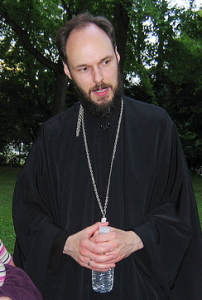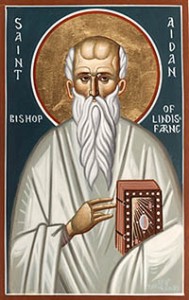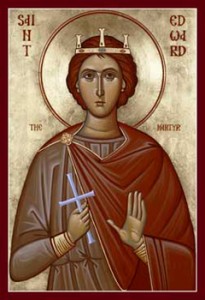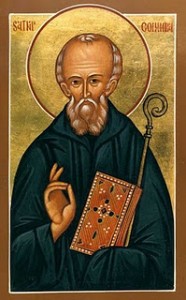by Fr. Geoffrey Korz
 I was born and raised a proud Anglican. For generations, my family were patrons of churches, ardent monarchists, and defenders of all things English and Christian. So why did I leave Anglicanism nearly two decades ago, to travel a slow but sure path to the historic, Orthodox Church?
I was born and raised a proud Anglican. For generations, my family were patrons of churches, ardent monarchists, and defenders of all things English and Christian. So why did I leave Anglicanism nearly two decades ago, to travel a slow but sure path to the historic, Orthodox Church?
Years ago, my search for historic, English Christianity led me to read the Ecclesiastical History of the English Church by the Venerable Bede. What did I find? An early encounter between the evangelist Saint Augustine, and English king Ethelbert struck me as somehow strange: Augustine’s companions carried images of Christ, painted on boards – «icons» as they are commonly known.
That’s strange, I thought – that’s what Greeks and Russians do, not English Christians.
The reasons soon became clear. Until the eleventh century, the English Church shared more than a love of icons with the whole body of the Church: they shared a communion of beliefs, moral practice, and liturgical life with the Church throughout the world. This lasted for centuries, but it was not to last forever.
Even after the Schism of 1054 – the division between Rome and the rest of the Christian world – England remained in communion with the Eastern Orthodox. In 1066, the Norman Invasion, with backing from the pope of Rome, forced the submission to Frankish Rome of all English churchmen. Rome had already broken communion with the Orthodox East, and changed the Creed and the Conciliar tradition of the Church by elevating one bishop – the Bishop of Rome – above all others.
 Why did the English remain in communion with the Orthodox East? Not because the English (and the Irish, Scots, and Welsh, as we would call them today) disliked Rome. The English church was part of the Orthodox church, from its beginnings, until ?he purge of Orthodox bishops following the Battle of Hastings.
Why did the English remain in communion with the Orthodox East? Not because the English (and the Irish, Scots, and Welsh, as we would call them today) disliked Rome. The English church was part of the Orthodox church, from its beginnings, until ?he purge of Orthodox bishops following the Battle of Hastings.
The English were Orthodox, I realized. So, why am I not?
Centuries later, by the time of the Reformation in the sixteenth century, England was ready for another division over the question of the national sovereignty of its religious life.
The English knew almost instinctively that something was not right with the idea of a single, Roman bishop claiming to rule the whole of Christendom, yet this issue became entangled with the desire of one English king -Henry VIII – to have a male heir. When the dust settled, England had a new religion, one which was no longer under Rome, one which was in communion with no one else in Christendom, one which had not returned to the Eternal wells of Christ’s historic Church.
Why does all this matter? It matters because the Church is the Bride of Christ. Since the Lord has only one Bride, it is not possible to come and go from the mystical union of the Church, and still be part of Her. Divisions are not simply matters of working out local issues and personal opinions: they are questions of eternal importance, questions of whether one is part of the Bride of Christ – His Church – or part of some other body that pretends to be so, based on certain reinterpretations of history, and personal slants on theology or moral questions.
It sometimes comes as a shock to people, that Orthodox Christianity doesn’t recognize rites and sacraments of Rome or of the Anglicans. Why is this? It arises out of the fact that when communion is broken, and beliefs are changed, new religions are formed. One African Anglican bishop recently suggested that North American Anglicans are not simply accepting diverse beliefs as they consider blessing same-sex unions: they are in fact creating a new religion. This is precisely the way historic Orthodoxy views the Schism of 1054, when Rome left the historic Church, and the further splintering of the Reformation.

St. Edward the English King & Martyr
Ironically, both Roman Catholics and Anglicans recognize the legitimacy of the Orthodox Church, the integrity of its teachings, its preservation of the eternal mysteries of ancient Christianity. Yet in the name of diversity, many western Christians simply ignore this fact, since it raises difficult questions, such as where is the Church? and why am I not in it?
The Orthodox Church recognizes that liturgical life forms beliefs, as well as reflecting them. The old Christian axiom, “lex orandi, lex credendi” holds true: the law (or rule) of worship is the law of belief. The two cannot be divided. When the Orthodox see liturgical revisions in Rome and among Anglicans, it is seen as inevitable that these both reflect and shape new beliefs. The outcome of this is clear to many faithful Anglicans and Roman Catholics: innovations in theology, as well as moral teachings, such as the questions of the priesthood, sexual morality, capital punishment, divorce, cremation, and the definition of marriage.
Queen Elizabeth the first prided herself on not inquiring into men’s hearts, opting instead for unity of communion over unity of belief. The Anglican faith has spent five centuries in this mode. Rome is essentially this way today. Orthodox Christianity is not, and never has been. It preserves unity of doctrine, practice, and belief with those in the Church today, as well as all the saints throughout the ages, because the Orthodox Church exists eternally, outside time, and is not just an anachronism.
Conversely, Anglicanism is built on the tradition of change, which cannot protect her from innovation. Traditional-minded Anglicans, fleeing redefined marriage or the ordination of women, cannot expect to find a safe harbour among so-called “continuing Anglicans”, or in the modern Church of England itself: they are based on the same revolutionary spirit of the Reformation. The only safe harbour for those who in their hearts seeks the historic Church is to return to the historic Church: the Orthodox Church.
 Orthodoxy has been preserved in the face of centuries of persecution at the hands of pagan Rome, Islam, and Communism , and has faced down heresies for twenty centuries. Its Biblically- rooted worship preserves the same spirit as the earliest centuries of its existence. The same faith that brought the world the Holy Scriptures and defended its truth against heresies continues to run through its veins. It is unchanging and eternal, because it is the Bride of an Unchanging and Eternal Husband. It cannot recreate the early Church, because it is the same Church, alive and struggling, and giving life to our troubled and changing times.
Orthodoxy has been preserved in the face of centuries of persecution at the hands of pagan Rome, Islam, and Communism , and has faced down heresies for twenty centuries. Its Biblically- rooted worship preserves the same spirit as the earliest centuries of its existence. The same faith that brought the world the Holy Scriptures and defended its truth against heresies continues to run through its veins. It is unchanging and eternal, because it is the Bride of an Unchanging and Eternal Husband. It cannot recreate the early Church, because it is the same Church, alive and struggling, and giving life to our troubled and changing times.
The English tradition is Orthodox. The true roots of Anglicanism can only be found in Orthodox Christianity. Augustine of Hippo told the faithful that we will never find rest, until we find rest in Christ; likewise, restless Anglicans will never find rest from the ever-changing storms of modernity until they return to the historic, Orthodox Faith. Canadian and American Anglicans in particular know the insecurity of spiritual lives lived in the shadow of modern pop culture, ever changing with the tides of popular opinion, fad, and fashion. Where can we find Christ, eternal and unchanging, the Alpha and the Omega?
The fact is, the historical reality of Christ’s Church remains undivided and unchanging, waiting with quiet patience for those who would return to Her for rest, stability, the fullness of Truth and joy. How long will those who are thirsty for this continue to visit empty wells, and remain restless and unsatisfied? The search for the Eternal cannot find satisfaction in hundreds of man-made sects, all reflections of the temporary world of our century, or centuries past. Christ has given His historic Church to the world, to preserve her in this sinful generation, and it is only in Her that the fullness of Christianity can be found.

I have a deep and abiding respect and love of the Orthodox Church and all its “exotic” idiosyncrasies (at least this is how they appear to an Anglican); I’ve even recently purchased the Menaion and various other materials to learn more about it. But at heart, I am now, and know I will always be, an Anglican Catholic – through and through. I think both our traditions have a tremendous amount to offer the orthodox (small “o” intended) Christian, and there are certainly many theological similarities, but I think it’s the difference in the liturgical aspects themselves that keep me where I’m at. Not merely a devotion to the idea of the filioque, but the entirety of the Anglican service and my personal comfort within it, always makes me view the Orthodox liturgy as somehow foreign. I would love for some materials to be produced (ostensibly by the JTO folks) to step-by-step explain the Orthodox service and other aspects of the Orthodox expression of the Christian faith – I think that would greatly helpful, both in discernment of something like this, and in growing in personal ministry and devotion.
What Fr Geoffrey Korz does not mention is that St Augustine was a Western rite Christian, he brought the Roman rite to Kent … if the Roman Canon was good enough for St Augustine of Canterbury, why is it not good enough for Orthodox today? If Anglicans want to join the Orthodox Church in England they have to use the Eastern rite, unless they are prepared to join ROCOR, who do have a small Wesern rite Mission in Bournemouth. but the British (UK) Antiochian Orthodox Deanery no longer makes any provision for the Western rite (unlike the Antiochian Archdiocese in North America) so if we wish to become more fully Orthodox in faith and many Anglican Catholics are already orthodox in terms of what they believe … we have bandon our liturgical patrimony. No wonder that many are not even considering Orthodoxy but turning rather to the Roman Catholic Ordinariate of Our Lady of Walsingham. When modern Orthodox talk about Orthodoxy, what they really mean is Byzantine rite!
As a former Anglican myself, I can say that the exotic quality of Orthodoxy fades into a clear vision of what it is – an image of heavenly worship, as we see in the book of Revelation. While western liturgical sensibilities are often ‘uncomfortable’ in eastern worship, I can say it fades fast once one realizes that the ‘foreign’ quality of Orthodoxy is less ethnic that anglo-centric liturgy. I mean this respectfully and as one having seen both from both sides.
Fr. Ryan,
If you are looking for a walk through of the Divine Liturgy (Eastern rite), then consider Steve and Bill’s discussion of it on Our Life in Christ. They have a 9 part series here (http://ourlifeinchrist.com/?page_id=325) where they discuss the divine liturgy in detail.
And, as a convert (from the Episcopal Church), I will agree with Fr John – all those perceived “exotic” idiosyncrasies disappear with continued immersion in the Church. There is something beautiful about the fact that you can travel almost anywhere, and, even when the service is celebrated in a different language, are able to worship in a manner consistent with the universal Church. Despite it’s traditional roots, this was unfortunately not my experience in TEC over the past several years.
May God bless you, Fr. Ryan, as you continue your own journey.
I came to Orthodoxy from an entirely non-liturgical background, and don’t know how I could have sought entrance into the communion of the saints without an eagerness to let go of unnecessary baggage. I would prefer to be refashioned within the Church, than to expect her to bend to my personal preference. Being comfortable is not a virtue.
I’m pretty sure the Antiochians also have some ‘western rite’ parishes, where the beauty of worship is faithfully expressed in a western form. Perhaps in the future, celebrations of the Divine Liturgy in America will take on a more western character, but we don’t live in the future yet.
What about the Western rite.?
The Western Rite is entirely Orthodoxy, but I personally do not recommend it for one good reason – an Orthodox Christian should feel comfortable and at home in ANY Orthodox Church ANYWHERE. This will not happen if someone simply converts to the Western Rite. Plus, parishes are far and wide, and even more difficult to find. Don’t get me wrong, I’m not against the Western Rite, I just think it is a poor choice for converts for a few good reasons.